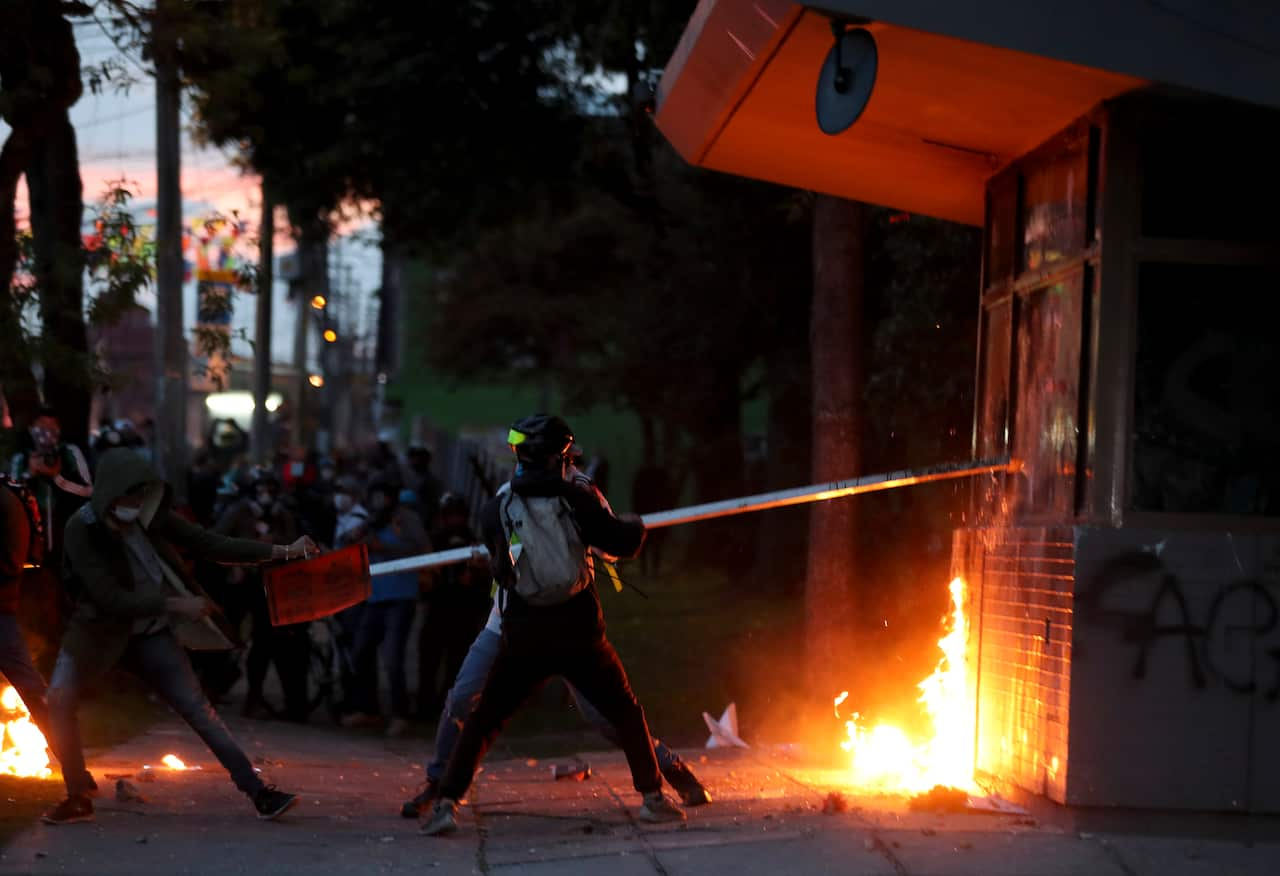An apology from Colombia's defence minister for police brutality failed to stop a third night of protests Friday, after the death of a man in custody sparked deadly rioting in the capital and other cities.
"I'm tired of police abuse. It's time to show that people are furious," a demonstrator, 20-year-old musician Camilo Medina told AFP.
At least 13 people were killed and more than 400 wounded during widespread disturbances on Wednesday and Thursday nights after a video released on social media showed Javier Ordonez being repeatedly tasered by police during a street arrest. He later died in custody. Flanked by police commanders at a news conference, Defence Minister Carlos Holmes Trujillo on Friday expressed his "pain and indignation" over the death of Mr Ordonez, an engineer and father of two in his 40s who was studying to become a lawyer.
Flanked by police commanders at a news conference, Defence Minister Carlos Holmes Trujillo on Friday expressed his "pain and indignation" over the death of Mr Ordonez, an engineer and father of two in his 40s who was studying to become a lawyer.

People protest in Bogota, Colombia, on 10 September. Source: AAP
"The national police apologise for any violation of the law or ignorance of the regulations incurred by any of the members of the institution," said Mr Trujillo, the minister with responsibility for the police.
But this was not enough to calm smaller crowds of demonstrators, who clashed sporadically with police as they protested once more in the capital Friday as well as in Medellin and other cities.
"What's an apology worth when you get shot in the back," raged a 26-year-old teacher, who did not want to reveal his identity for fear of reprisals, in Bogota.
Some 2,000 police and military were called in to reinforce security in the capital.

Demonstrators attack a police post during protests in Bogota on 10 September. Source: AAP
'Please, no more'
A lawyer for the victim's family claimed Mr Ordonez had died after being brutally beaten at a police station, following the repeated taser shocks.
Mr Ordonez is heard repeatedly crying "please, no more" in the widely circulated footage of his arrest, taken by a friend.
"I have photos of how they left the victim. Javier was massacred - the crime of aggravated homicide and the crime of torture was committed," lawyer Vadith Gomez told Bogota's Radio Blu.
Mr Ordonez's family said he had gone out to buy alcohol when he was arrested.
Police authorities have opened an internal investigation against two uniformed officers "for the alleged crime of abuse of authority and homicide," the defence minister said. Mr Trujillo told the news conference that five other police officers had been suspended from duty.
Mr Trujillo told the news conference that five other police officers had been suspended from duty.

People at a demonstration in Bogota, Colombia, on 10 September. Source: AAP
European Union foreign policy chief Josep Borrell condemned the police's "excessive" use of force in response to the demonstrations, saying the right to peaceful protest was "essential to any democracy."
He called for an investigation so those responsible can be "brought to justice, and institutional measures taken to avoid any repetition."
'Excessive force'
Street protests first erupted in several areas of the capital late Wednesday and quickly turned violent as video of Mr Ordonez's mistreatment circulated.
Rioting also erupted in the cities of Medellin and Cali.
Police were accused of opening fire on protesters, and most of the 13 dead had suffered gunshot wounds, according to the office of Bogota's leftist mayor, Claudia Lopez. A number of videos circulating on social networks showed uniformed officers being attacked by demonstrators and responding with gunfire.
A number of videos circulating on social networks showed uniformed officers being attacked by demonstrators and responding with gunfire.

Riot police confront demonstrators during a protest in Bogota on 10 September. Source: AAP
The government accused demonstrators of "systematic and coordinated vandalism," but Ms Lopez slammed the police for using live fire to quell the protests, saying 68 people had suffered gunshot wounds.
"There is solid evidence of the indiscriminate use of firearms by the police," the mayor said.
Authorities reported a total of 209 protesters wounded as well as 194 police. Dozens of police posts, as well as police and municipal vehicles, were destroyed. "This is not a problem that comes only from now. It is a problem that we have always had with the police and military forces," said Bogota resident Jose Maria Builes.
"This is not a problem that comes only from now. It is a problem that we have always had with the police and military forces," said Bogota resident Jose Maria Builes.

Demonstrators participate in a protest against police brutality in Bogota on 10 September. Source: AAP
"Excessive force has always been used here," he said.
For many Colombians, the Ordonez case evoked the killing in the United States in May of African-American man George Floyd, who suffocated after being pinned by the neck to the road under the knee of a white officer.

